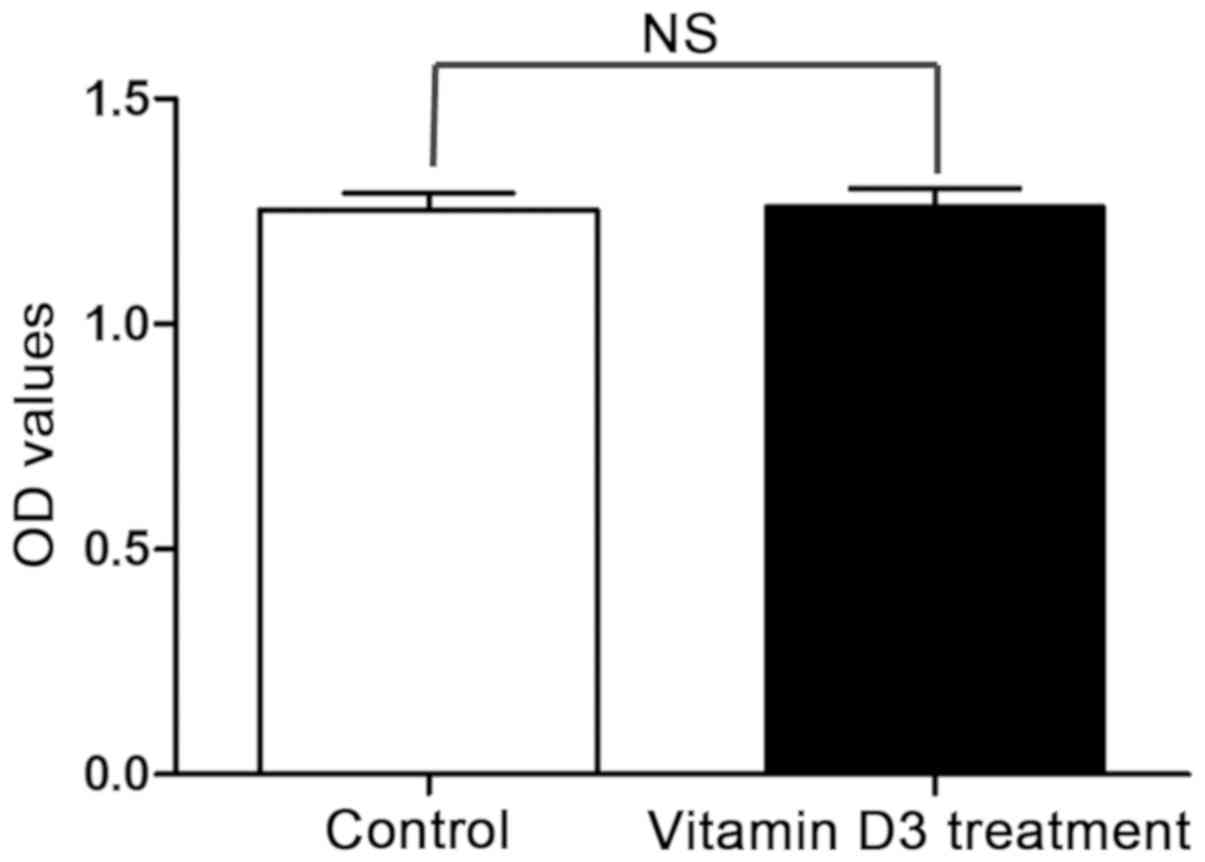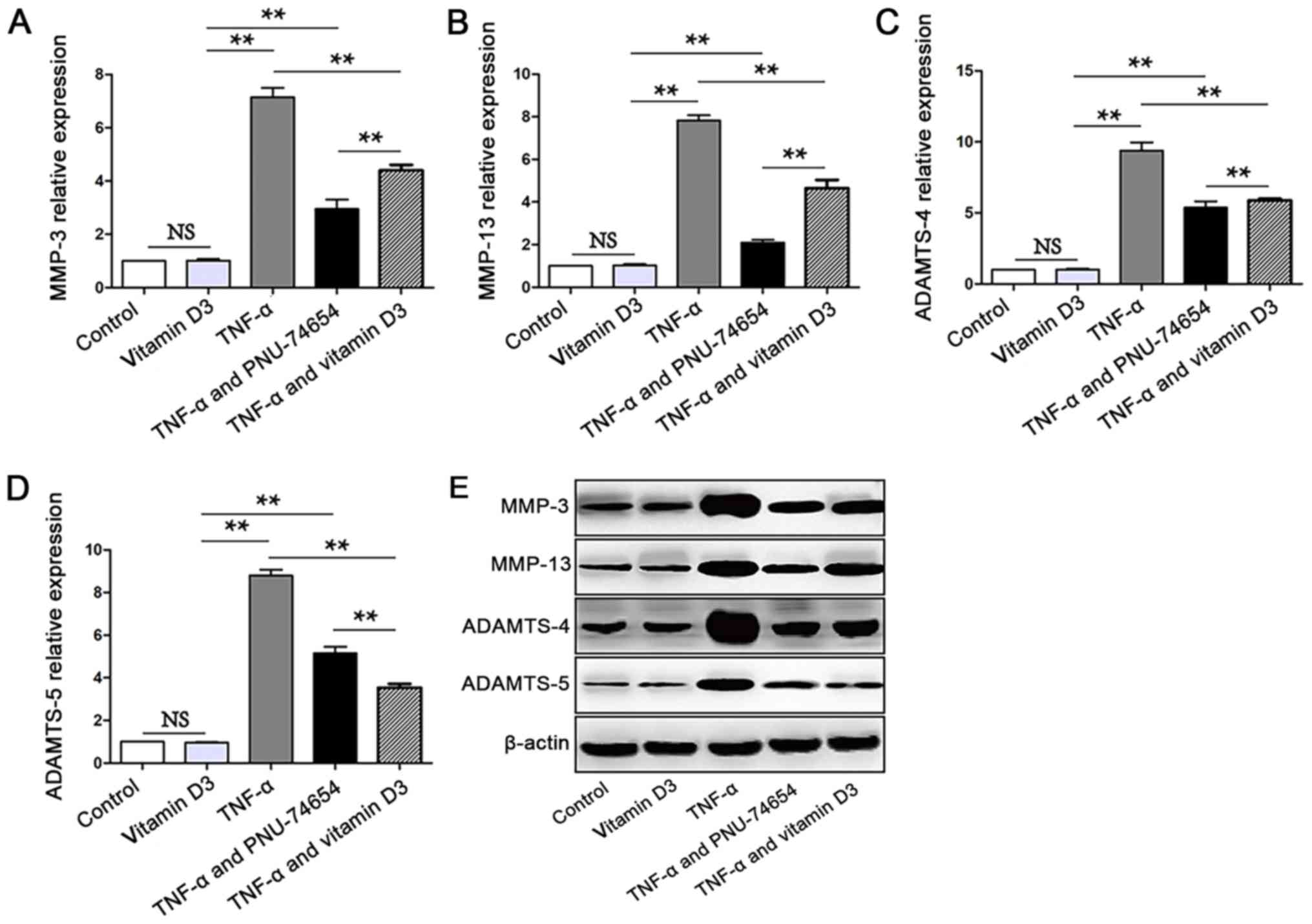|
1
|
Bortoluzzi A, Furini F and Scirè CA:
Osteoarthritis and its management - Epidemiology, nutritional
aspects and environmental factors. Autoimmun Rev. 17:1097–1104.
2018.PubMed/NCBI View Article : Google Scholar
|
|
2
|
Kanemitsu M, Nakasa T, Shirakawa Y,
Ishikawa M, Miyaki S and Adachi N: Role of vasoactive intestinal
peptide in the progression of osteoarthritis through bone sclerosis
and angiogenesis i n subchondral bone. J Orthop Sci: Jan 9, 2020
(Epub ahead of print).
|
|
3
|
Majeed MH, Sherazi SAA, Bacon D and Bajwa
ZH: Pharmacological treatment of pain in osteoarthritis: A
descriptive review. Curr Rheumatol Rep. 20(88)2018.PubMed/NCBI View Article : Google Scholar
|
|
4
|
Cao Y, Winzenberg T, Nguo K, Lin J, Jones
G and Ding C: Association between serum levels of 25-hydroxyvitamin
D and osteoarthritis: A systematic review. Rheumatology (Oxford).
52:1323–1334. 2013.PubMed/NCBI View Article : Google Scholar
|
|
5
|
Tetlow LC and Woolley DE: Expression of
vitamin D receptors and matrix metalloproteinases in osteoarthritic
cartilage and human articular chondrocytes in vitro. Osteoarthritis
Cartilage. 9:423–431. 2001.PubMed/NCBI View Article : Google Scholar
|
|
6
|
Sun X, Huang H, Pan X, Li S, Xie Z, Ma Y,
Hu B, Wang J, Chen Z and Shi P: EGR1 promotes the cartilage
degeneration and hypertrophy by activating the Krüppel-like factor
5 and β-catenin signaling. Biochim Biophys Acta Mol Basis Dis.
1865:2490–2503. 2019.PubMed/NCBI View Article : Google Scholar
|
|
7
|
De Santis M, Di Matteo B, Chisari E,
Cincinelli G, Angele P, Lattermann C, Filardo G, Vitale ND, Selmi C
and Kon E: The role of Wnt pathway in the pathogenesis of OA and
its potential therapeutic implications in the field of regenerative
medicine. BioMed Res Int. 2018(7402947)2018.PubMed/NCBI View Article : Google Scholar
|
|
8
|
Gröschel C, Aggarwal A, Tennakoon S,
Höbaus J, Prinz-Wohlgenannt M, Marian B, Heffeter P, Berger W and
Kállay E: Effect of 1,25-dihydroxyvitamin D3 on the Wnt pathway in
non-malignant colonic cells. J Steroid Biochem Mol Biol. 155 (Pt
B):224–230. 2016.PubMed/NCBI View Article : Google Scholar
|
|
9
|
Nusse R and Clevers H: Wnt/β-Catenin
Signaling, Disease, and Emerging Therapeutic Modalities. Cell.
169:985–999. 2017.PubMed/NCBI View Article : Google Scholar
|
|
10
|
Zhou B, Chen D, Xu H and Zhang X:
Proliferation of rabbit chondrocyte and inhibition of IL-1β-induced
apoptosis through MEK/ERK signaling by statins. In Vitro Cell Dev
Biol Anim. 53:124–131. 2017.PubMed/NCBI View Article : Google Scholar
|
|
11
|
Livak KJ and Schmittgen TD: Analysis of
relative gene expression data using real-time quantitative PCR and
the 2(-Δ Δ C(T)) method. Methods. 25:402–408. 2001.PubMed/NCBI View Article : Google Scholar
|
|
12
|
McCarty EC: Articular Cartilage: The
Search for the Holy Grail of Treatment and Restoration. Clin Sports
Med. 36:xv–xvi. 2017.PubMed/NCBI View Article : Google Scholar
|
|
13
|
Castillo EC, Hernandez-Cueto MA,
Vega-Lopez MA, Lavalle C, Kouri JB and Ortiz-Navarrete V: Effects
of vitamin D supplementation during the induction and progression
of osteoarthritis in a rat model. Evid Based Complement Alternat
Med. 2012(156563)2012.PubMed/NCBI View Article : Google Scholar
|
|
14
|
Hunt MA, Charlton JM and Esculier JF:
Osteoarthritis year in review 2019: Mechanics. Osteoarthritis
Cartilage. 28:267–274. 2020.PubMed/NCBI View Article : Google Scholar
|
|
15
|
Zeng YF, Wang R, Bian Y, Chen WS and Peng
L: Catalpol attenuates IL-1β induced matrix catabolism, apoptosis
and inflammation in rat chondrocytes and inhibits cartilage
degeneration. Med Sci Monit. 25:6649–6659. 2019.PubMed/NCBI View Article : Google Scholar
|
|
16
|
Zhao Y, Li Y, Qu R, Chen X, Wang W, Qiu C,
Liu B, Pan X, Liu L, Vasilev K, et al: Cortistatin binds to TNF-α
receptors and protects against osteoarthritis. EBioMedicine.
41:556–570. 2019.PubMed/NCBI View Article : Google Scholar
|
|
17
|
Urban H and Little CB: The role of fat and
inflammation in the pathogenesis and management of osteoarthritis.
Rheumatology (Oxford). 57 (Suppl 4):iv10–iv21. 2018.PubMed/NCBI View Article : Google Scholar
|
|
18
|
Tian J, Rui YJ, Xu YJ and Zhang SA: J. T:
miR-143-3p regulates early cartilage differentiation of BMSCs and
promotes cartilage damage repair through targeting BMPR2. Eur Rev
Med Pharmacol Sci. 22:8814–8821. 2018.PubMed/NCBI View Article : Google Scholar
|
|
19
|
Chijiiwa M, Mochizuki S, Kimura T, Abe H,
Tanaka Y, Fujii Y, Shimizu H, Enomoto H, Toyama Y and Okada Y: CCN1
(Cyr61) is overexpressed in human osteoarthritic cartilage and
inhibits ADAMTS-4 (aggrecanase 1) activity. Arthritis Rheumatol.
67:1557–1567. 2015.PubMed/NCBI View Article : Google Scholar
|
|
20
|
Rogerson FM, Last K, Golub SB, Gauci SJ,
Stanton H, Bell KM and Fosang AJ: ADAMTS-9 in Mouse Cartilage Has
Aggrecanase Activity That Is Distinct from ADAMTS-4 and ADAMTS-5.
Int J Mol Sci. 20(573)2019.PubMed/NCBI View Article : Google Scholar
|
|
21
|
Seidl CI and Murphy CL: CI: Dual and
Opposing Regulation of MMP1 and MMP13 by Both Arms of miR-675 in
Human Articular Chondrocytes. Cell Physiol Biochem. 53:172–185.
2019.PubMed/NCBI View Article : Google Scholar
|
|
22
|
Malemud CJ: Inhibition of MMPs and
ADAM/ADAMTS. Biochem Pharmacol. 165:33–40. 2019.PubMed/NCBI View Article : Google Scholar
|
|
23
|
Yu HT, Gu CZ and Chen JQ: MiR-9
facilitates cartilage regeneration of osteoarthritis in rabbits
through regulating Notch signaling pathway. Eur Rev Med Pharmacol
Sci. 23:5051–5058. 2019.PubMed/NCBI View Article : Google Scholar
|
|
24
|
Mazur CM, Woo JJ, Yee CS, Fields AJ,
Acevedo C, Bailey KN, Kaya S, Fowler TW, Lotz JC, Dang A, et al:
Osteocyte dysfunction promotes osteoarthritis through
MMP13-dependent suppression of subchondral bone homeostasis. Bone
Res. 7(34)2019.PubMed/NCBI View Article : Google Scholar
|
|
25
|
Shu CC, Flannery CR, Little CB and Melrose
J: Catabolism of fibromodulin in developmental rudiment and
pathologic articular cartilage demonstrates novel roles for MMP-13
and ADAMTS-4 in C-terminal processing of SLRPs. Int J Mol Sci.
20(579)2019.PubMed/NCBI View Article : Google Scholar
|
|
26
|
Tang LP, Ding JB, Liu ZH and Zhou GJ: LP:
LncRNA TUG1 promotes osteoarthritis-induced degradation of
chondrocyte extracellular matrix via miR-195/MMP-13 axis. Eur Rev
Med Pharmacol Sci. 22:8574–8581. 2018.PubMed/NCBI View Article : Google Scholar
|
|
27
|
van Geffen EW, van Caam APM, Schreurs W,
van de Loo FA, van Lent PLEM, Koenders MI, Thudium CS, Bay-Jensen
AC, Blaney Davidson EN and van der Kraan PM: IL-37 diminishes
proteoglycan loss in human OA cartilage: Donor-specific link
between IL-37 and MMP-3. Osteoarthritis Cartilage. 27:148–157.
2019.PubMed/NCBI View Article : Google Scholar
|
|
28
|
Guo L, Hao R, Tian F, An N and Wang K:
Interferon regulatory factor 5 (IRF5) regulates the expression of
matrix metalloproteinase-3 (MMP-3) in human chondrocytes. Int
Immunopharmacol. 55:231–236. 2018.PubMed/NCBI View Article : Google Scholar
|
|
29
|
Miyamoto K, Ohkawara B, Ito M, Masuda A,
Hirakawa A, Sakai T, Hiraiwa H, Hamada T, Ishiguro N and Ohno K:
Fluoxetine ameliorates cartilage degradation in osteoarthritis by
inhibiting Wnt/β-catenin signaling. PLoS One.
12(e0184388)2017.PubMed/NCBI View Article : Google Scholar
|
|
30
|
Ma L, Wu J and Jin QH: The association
between parathyroid hormone 1-34 and the Wnt/β-catenin signaling
pathway in a rat model of osteoarthritis. Mol Med Rep.
16:8799–8807. 2017.PubMed/NCBI View Article : Google Scholar
|
|
31
|
Sun Y, Wang F, Sun X, Wang X, Zhang L and
Li Y: CX3CR1 regulates osteoarthrosis chondrocyte proliferation and
apoptosis via Wnt/β-catenin signaling. Biomed Pharmacother.
96:1317–1323. 2017.PubMed/NCBI View Article : Google Scholar
|
|
32
|
Yuasa T, Otani T, Koike T, Iwamoto M and
Enomoto-Iwamoto M: Wnt/beta-catenin signaling stimulates matrix
catabolic genes and activity in articular chondrocytes: Its
possible role in joint degeneration. Lab Invest. 88:264–274.
2008.PubMed/NCBI View Article : Google Scholar
|
|
33
|
Li WJ, Tang LP, Xiong Y, Chen WP, Zhou XD,
Ding QH and Wu LD: A possible mechanism in DHEA-mediated protection
against osteoarthritis. Steroids. 89:20–26. 2014.PubMed/NCBI View Article : Google Scholar
|


















